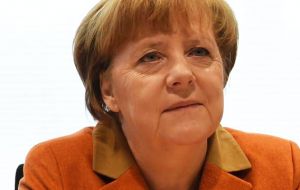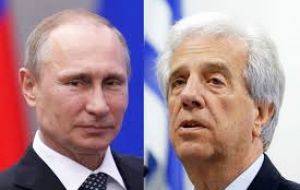MercoPress. South Atlantic News Agency
Uruguayan president and business delegation begin tour of Germany, Finland and Russia
 Merkel said the EU/Mercosur trade accord is a “strategic” priority for Germany and Vazquez' visit takes place just days before another round of negotiations
Merkel said the EU/Mercosur trade accord is a “strategic” priority for Germany and Vazquez' visit takes place just days before another round of negotiations  UPM is satisfied with its first pulp plant in Fray Bentos, next to the Uruguay river, but is more cautious about a second investment
UPM is satisfied with its first pulp plant in Fray Bentos, next to the Uruguay river, but is more cautious about a second investment  The meeting in Moscow with Vladimir Putin is mainly political but with hopes of again having Russia as a main market for Uruguayan beef and dairy produce
The meeting in Moscow with Vladimir Putin is mainly political but with hopes of again having Russia as a main market for Uruguayan beef and dairy produce Uruguayan president Tabare Vazquez, six cabinet ministers and a numerous business delegation begin on Monday a two weeks official tour of Germany, Finland and Russia to increase political and trade links, particularly in the “new international scenario” and hopefully advancing in locking the long delayed accord between the European Union and Mercosur.
The first stop is in Germany and a meeting with Chancellor Angela Merkel, the most influential European leader who anticipated in her Saturday radio message that Berlin is interested in increasing links with Uruguay, “a country known for its good soccer”, but also for its longstanding commitment to democratic values and a pioneer in the region in issues related to gender equality, environment protection and reducing poverty.
But Merkel also underlined that the EU/Mercosur trade accord is a “strategic” priority for Germany and Vazquez' visit takes place just days before another round of negotiations in Brussels and Buenos Aires. The scenario is encouraging since for the first time in years Mercosur senior members, Brazil and Argentina coincide in economic and political policies, and are determined to open Mercosur to the world and serious partners.
Given that Uruguay desperately needs to improve its infrastructure, logistics, railways and ports, Germany has organized ministerial visits to mechanical equipments centers, the port of Hamburg, sea terminals and shipyards. Bilateral trade is insignificant in German terms, but Merkel said there was “ample potential to expand”.
“Germany is our main trade partner in the EU and fifth at world level. Germany is also the engine of Europe with a market of 90 million of which Uruguay must take advantage of this, and target sophisticated markets”, said Gustavo Weigel, president of the Germany/Uruguay chamber of commerce.
The following stop is Finland and probably the most controversial since president Vazquez will try to convince the UPM Corporation to make public its commitment of a second pulp mill in Uruguay. This involves an estimated investment of 5bn dollars which compared to a GDP of 65bn gives an idea of its economic...and political significance of the deal.
However even when UPM is satisfied with its first pulp plant in Fray Bentos, next to a major river, the company has been very clear in reference to a second investment. In effect Uruguay, one of several candidates considered, must invest over a billion dollars in infrastructure, railway, ports, power, plus a peace clause regarding labor conflicts.
The infrastructure funds despite ten years of a booming economy are not existent and Uruguay is precisely visiting Germany, Russia, as it did a few months ago Spain and China to try and convince these countries to share such undertakings. So far results are promises, and the peace clause, has been rejected point blank by the very strong unions, which are also one of the main supports of the Vazquez Broad Front administration.
Thus the Helsinki stop can be expected to be a display of Orwellian language as to the advances and commitment supposedly reached with the Finnish corporation. UPM has said the decision on a second pulp mill investment is a three chapters 36-month process, which is in the first stage.
The last is the Moscow stop and meeting with Vladimir Putin is mainly political but with hopes of again having Russia as a main market for Uruguayan beef and dairy produce. Likewise some further advances in defense issues. The Uruguayan ruling coalition has a significant influence of the local communist party that dominates unions, and which still admires and looks back with tears to the anti-imperialist ex Soviet Union, especially in such a sensitive year, the 100th anniversary of the Bolshevik revolution, had it not been for the “traitor” Gorvachev.
Finally it must be mentioned that even when Uruguay is above all an exporter of agriculture commodities, the delegation accompanying the president does not include farm associations or representatives. The official version is that they did not apply to travel with president Vazquez, but farmers argue they were never invited. Apparently this is because they refused to sign a unions/government salaries agreement for camp labor, arguing it had no relation with current prices for commodities, and the fact that the promise of no farm taxes, has not been honored by the current administration.
Nevertheless union representatives will be travelling with president Vazquez, invited by government.
No matter the results of this European two-week tour which includes several conferences of President Vazquez on his favorite issue, banning smoking and the consequences of tobacco, the Uruguayan leader is already preparing a new trip, this time to Angola, Australia, Indonesia and Vietnam.
Chancellor Angela Merkel, the most influential European leader who anticipated in her Saturday radio message that Berlin is interested in increasing links with Uruguay, “a country known for its good soccer”, but also for its longstanding commitment to democratic values and a pioneer in the region in issues related to gender equality, environment protection and reducing poverty.




Top Comments
Disclaimer & comment rules
Read all commentsCommenting for this story is now closed.
If you have a Facebook account, become a fan and comment on our Facebook Page!